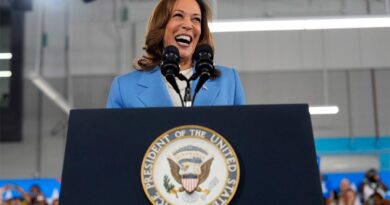Trump’s Victory: A Demand for Law and Order Amidst Ongoing Police Demonization by Democrats

“Perhaps this will all come to an end in a week,” sighed the cashier at a CVS on the Upper East Side, a week after President Trump had taken office. A young man, holding a black plastic garbage bag, had just bolted out the entrance. “Maybe this will end in another week,” sighed the cashier at a CVS store on the Upper East Side, seven days after President Trump’s inauguration. A young male, clutching a black plastic garbage bag, had just darted out the door.
The thief had nonchalantly roamed the store, undisturbed, despite fitting the profile of the most common shoplifting demographic and openly carrying a bag for his loot. After he hastily escaped, no one bothered to contact the police. The store staff were well aware that local officers were unlikely to respond — and if they did, nothing significant would occur.
Meanwhile, I had to call a clerk to access the store’s calcium supplements, which were secured behind plexiglass.
So much for the alleged racial profiling that former Presidents Barack Obama and Joe Biden often claimed the nation was entrenched in.
The cashier wearily gestured toward a display of batteries at the front of the store — a curious target of the latest theft — which was oddly left unsecured.
The clerk, with long gray corkscrew curls, a beard, and a heavy Puerto Rican accent, did not seem like the typical Donald Trump supporter. Yet here he was, implying that his mention of “another week” was self-explanatory and that I would agree with his wish for a substantial political shift.
Abandoned by Democrats
“People inquire: ‘How can you support him?’” he said, still reluctant to name Trump directly. “But he has to take action. The voters chose him.”
The Democrats cultivated this Trump supporter. Their escalating demonization of law enforcement intensified following the George Floyd riots. Police chiefs in major cities opted not to enforce laws, and progressive prosecutors shied away from indicting offenses, all in the name of preventing disparate impact.
Eventually, the criminal element figured it could loot without repercussions. Across the nation, smash-and-grab thefts surged; retailers were left bare; city blocks filled with empty storefronts. The groups that Democrats claim to advocate for — bodega workers, retail employees, delivery drivers — experienced daily chaos and bore its consequences.
As for the “lives” that the Democrats’ strategies of depolicing and deprosecution were meant to safeguard, thousands more black victims fell to the increase in drive-by shootings after George Floyd’s death. Those black lives didn’t seem to matter to Black Lives Matter activists because the assailants belonged to the “wrong” racial group.
President Trump’s executive actions, initiated with the relentless force of a military operation, have transformed the landscape in just 14 days. While the task of removing racial bias from federal institutions, academia, scientific associations, and corporate human resources will face obstacles, meeting the expectations of these new Trump voters will be an even greater challenge.
It is local authorities who have unleashed this urban turmoil. They are even less receptive to presidential authority than the entrenched bureaucratic system. Trump cannot order district attorneys in New York or other locations to prosecute minor offenses or seek lengthy sentences for repeat offenders. He cannot mandate that city police departments address public disorder.
Attorney General-designate Pam Bondi has the authority to instruct US attorneys to pursue violent federal offenses without the filter of racial politics. However, most property crimes fall outside federal jurisdiction — especially the commonplace shoplifting that has drained urban pharmacies.
The future FBI director, Kash Patel, promised during the campaign to deploy numerous agents from the FBI’s Washington, DC, headquarters to combat crime nationwide. However, it’s unlikely that FBI agents will target turnstile jumpers and impulse thieves.
Deporting illegal alien criminals is beneficial. Nonetheless, it is primarily the native criminal element that drives most street crime.
‘New sheriff in town’
Yet, the evolving Trump phenomenon may improve even the minutiae of urban life.
For four years, no one from the federal government advocated for the rights of law-abiding citizens who work hard. No one empathized with shop owners and employees compelled to watch helplessly as vagrants ravaged their workplaces unchecked.
In contrast, Trump instinctively grasps the significance of public order. During a campaign rally in July, he pledged to “eradicate all graffiti from the marble” in Washington, DC. He has lamented the filth and degradation characterizing the capital city. His disdain for looting has drawn ire from mainstream media.
By simply stressing the necessity of law and order and defending the sanctity of private property, Trump may place progressive officials in a defensive position.
And he holds an additional card. His campaign platform suggested probing left-leaning prosecutors for racially biased enforcement — that is, for implementing non-prosecution policies designed to avoid disparate impacts on black criminals. Determining the legal viability of such a challenge will be complex. Local DAs will invoke their inherent discretion in making prosecutorial decisions (ironically, Trump himself has claimed executive discretion in ignoring the congressional ban on TikTok). Furthermore, granting the federal government this kind of authority over local prosecutorial choices could unfold unfavorably when political power shifts.
Nevertheless, there’s a compelling argument that considering race in law enforcement policies infringes upon the 14th Amendment. Border czar Tom Homan has also proposed a unique strategy: prosecuting officials in sanctuary cities for obstructing federal law enforcement. This legal strategy against the racially biased enforcement of laws merits further examination. At the very least, Trump should hold district attorneys accountable for failing to uphold their oath to deliver justice without regard to color.
As the cashier at CVS indicated, hopes for the new presidency are running high. While Trump may not completely repair New York in just three weeks, four years of consistently vocal support for law and order could lead to significant changes.
A commuter reported that four days post-inauguration, everyone on his bus in DC paid their fare — a notable shift from the usual fare evaders. “The word is spreading: There’s a new sheriff in town,” the passenger speculated.
If America’s urban areas reclaim property security and eliminate the notion that crime has become normalized, the political shift that commenced with this election may solidify into a lasting reality. And city residents might finally regain access to their pharmacies.
Heather Mac Donald is the Thomas W. Smith fellow at the Manhattan Institute and the author of “When Race Trumps Merit.”



